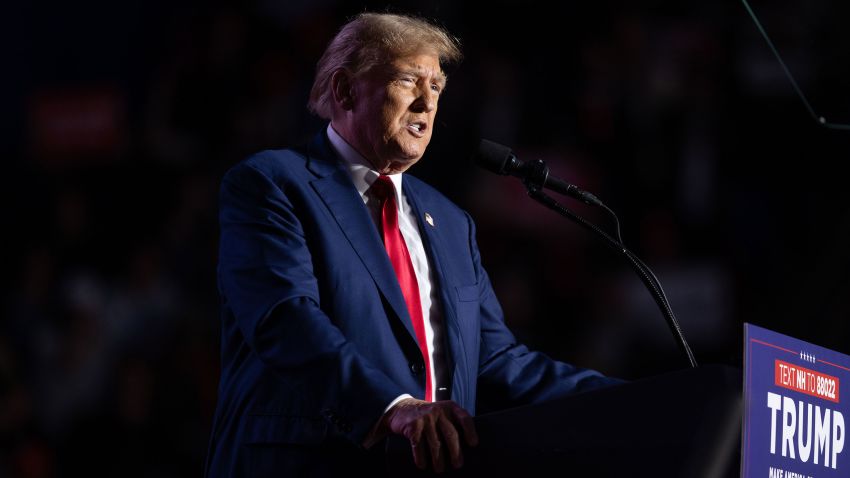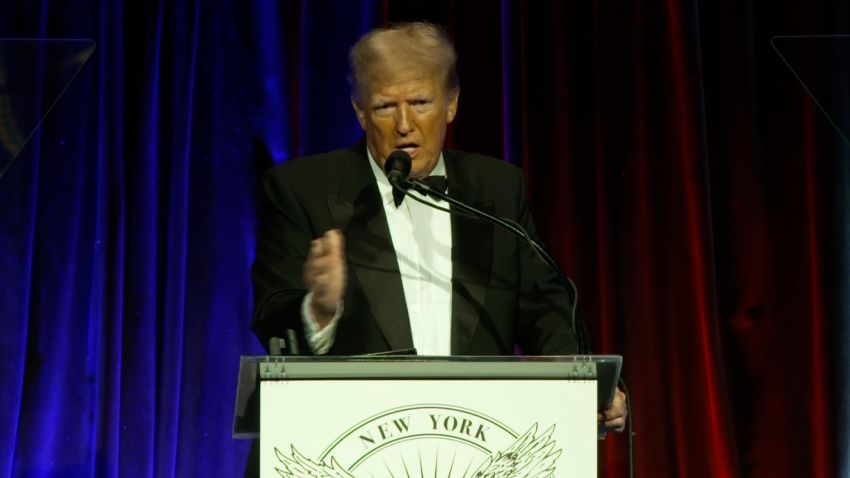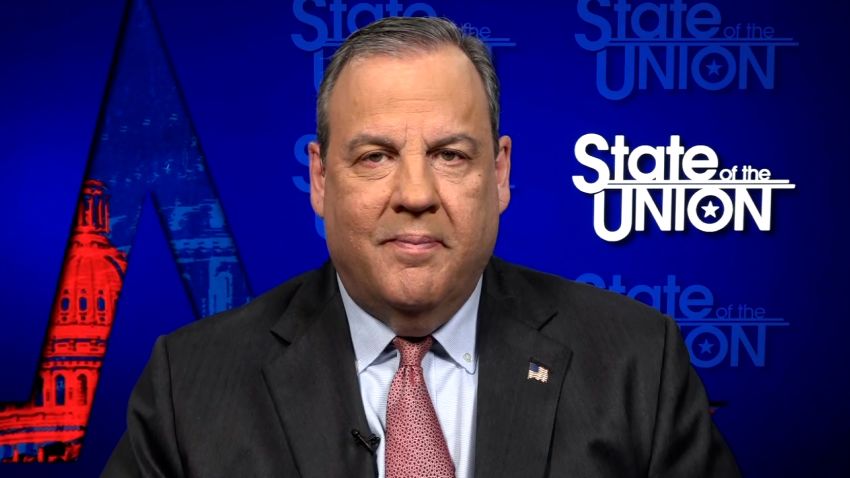CNN
—
Donald Trump’s rhetoric dropped to a spine-tingling new low this weekend with less than a month before the Iowa caucuses.
The GOP primary front-runner said migrants are “poisoning the blood” of the US and quoted Russian President Vladimir Putin about the “rottenness” of American democracy.
Whipping up thousands of supporters at a New Hampshire hockey rink on Saturday, the former president again drew comparisons to the language of Nazi Germany with the comments about migrants from mostly Africa, Asia and South America “poisoning the blood of our country.”
CNN
” data-fave-thumbnails=”{“big”: { “uri”: “https://media.cnn.com/api/v1/images/stellar/prod/231216151500-05-trump-rally-nh1216.jpg?c=16×9&q=h_540,w_960,c_fill” }, “small”: { “uri”: “https://media.cnn.com/api/v1/images/stellar/prod/231216151500-05-trump-rally-nh1216.jpg?c=16×9&q=h_540,w_960,c_fill” } }” data-vr-video=”false” data-show-html=” Newsroom
” data-byline-html=”
” data-check-event-based-preview=”” data-network-id=”” data-details=””>

Trump repeats anti-immigrant rhetoric at New Hampshire rally
The language “parrots Adolf Hitler,” President Joe Biden’s reelection campaign alleged. Experts pointed to passages in Hitler’s manifesto “Mein Kampf” in which the future dictator called for racial purity and said German blood was being “poisoned” by Jews.
Trump has used the line previously, in an interview with a conservative news outlet, and bringing it out for a rally suggests he could be adding it to his routine.
He drew criticism last month for describing his political rivals as “vermin,” another term that has antisemitic connotations and was employed in Nazi rhetoric.
It’s the repetition of these lines, after their fascist roots are called out, that is more chilling than their first utterance. The former president — who leads Biden in some swing-state polling of a hypothetical rematch — has a long history with language that plays on racial prejudice and excites the right wing.
His recently repeated claim that he wants to be “dictator” for one day to build his border wall and stop immigration could be laughed off as a joke if he didn’t keep saying it.
On Sunday night, at rally in Reno, Nevada — the third GOP-nominating state — Trump claimed, without evidence, that migrants are largely coming from prisons and mental institutions. And he wondered, again without evidence, if Chinese migrants crossing the border are meant to be part of an invading army. Trump promised to reorient the US government to purge migrants. Claiming the US is now a “haven for bloodthirsty criminals,” he said he would invoke the Alien Enemies Act, a 1798 law, to remove migrants from the country. The former president also promised to divert the FBI and Drug Enforcement Administration to border actions.
CNN
” data-fave-thumbnails=”{“big”: { “uri”: “https://media.cnn.com/api/v1/images/stellar/prod/231211113121-trump-ny-event.jpg?c=16×9&q=h_540,w_960,c_fill” }, “small”: { “uri”: “https://media.cnn.com/api/v1/images/stellar/prod/231211113121-trump-ny-event.jpg?c=16×9&q=h_540,w_960,c_fill” } }” data-vr-video=”false” data-show-html=”” data-byline-html=”
” data-check-event-based-preview=”” data-network-id=”” data-details=””>

Trump says this is why he ‘wanted to be a dictator’
“He’s a populist, authoritarian narcissist,” the Republican former House Speaker Paul Ryan said last week, before Trump’s most recent comments. “So, historically speaking, all of his tendencies are basically where narcissism takes him, which is whatever makes him popular, makes him feel good at any given moment.”
Dictators erase freedoms, but Trump — who tried to overturn the 2020 election after he lost — needs an electoral victory to get there. On Saturday, he called his campaign a “righteous campaign to liberate this nation” and said, to cheers, “we are not a free nation.”
It is no longer even jarring when Trump speaks highly of authoritarian leaders, such as North Korea’s Kim Jong Un or Hungary’s Viktor Orban, as he did again Saturday in New Hampshire.
But Trump went a step further, twisting around the idea put forward by his rivals, including Biden and former Rep. Liz Cheney, that he is a threat to democracy for trying to overturn the last election.
Instead, Trump now argues, it is Biden who is a “threat to democracy.”
As a way of proving the claim, Trump cited Putin, who said in September that Trump’s legal problems are “politically motivated persecution” that is good for Russia. “‘It shows the rottenness of the American political system, which cannot pretend to teach others about democracy,’” Trump went on, quoting the Russian president.
The truth is that Putin knows about rotten systems and putting political enemies in jail; supporters of Putin’s chief rival, Alexey Navalny, can’t locate the dissident leader who is serving a 19-year prison sentence.
Trump is facing multiple criminal trials. But he will have to be convicted by unanimous juries, assuming he is tried at all. The US Supreme Court, on which three of his appointees sit, has been asked by prosecutors to weigh in on whether Trump, as a former president, is immune from prosecution.
One of Trump’s rivals for the Republican presidential nomination, former New Jersey Gov. Chris Christie, said the pending trials are contributing to Trump’s increasingly intense rhetoric.
“Donald Trump realizes the walls are closing in,” Christie told CNN’s Jake Tapper on “State of the Union” on Sunday. “He’s becoming crazier. And now he’s citing Vladimir Putin as a character witness, a guy who is a murderous thug all around the world.”
Trump-supporting Republicans like Sen. Lindsey Graham of South Carolina don’t seem to care much what the former president says.
“We’re talking about language. I could care less what language people use as long as we get it right,” Graham said on NBC’s “Meet the Press,” although he also made clear he doesn’t agree with the poisoned blood analogy. “I believe in legal immigration. I have no animosity toward people trying to come to our country. I have animosity against terrorists and against drug dealers.”
Twisting a warning about him and turning it into a rallying cry for his supporters is a classic Trump tactic.
He didn’t use the term “Fake News” to describe the mainstream media until after Hillary Clinton warned about an epidemic of misinformation, which she called “fake news.” Trump first used the term in a tweet the next day, on December 10, 2016, according to The Washington Post. He’s repeated it so often, including at the New Hampshire event, that now he claims to have invented it.
Similarly, he has frequently and falsely referred to the idea that he lost the 2020 election as a “big lie,” coopting it from warnings — citing the strategy of Nazi propagandists — that his repeated claims that the election results were false would ultimately convince his followers. The term “big lie” also appears in “Mein Kampf.” Most Republicans and GOP-leaners — nearly 70% in a CNN poll in August — don’t think Biden’s win was legitimate.
Tapper also played for Christie video of Trump’s comments about migrants “poisoning the blood of the country.”
CNN
” data-fave-thumbnails=”{“big”: { “uri”: “https://media.cnn.com/api/v1/images/stellar/prod/231217092443-chris-chrisite-sotu-12-17.jpg?c=16×9&q=h_540,w_960,c_fill” }, “small”: { “uri”: “https://media.cnn.com/api/v1/images/stellar/prod/231217092443-chris-chrisite-sotu-12-17.jpg?c=16×9&q=h_540,w_960,c_fill” } }” data-vr-video=”false” data-show-html=” State of the Union
” data-byline-html=”
” data-check-event-based-preview=”” data-network-id=”” data-details=””>

‘He’s disgusting’: Chris Christie responds to Trump’s campaign comments
“He’s disgusting,” Christie said. “And what he’s doing is dog whistling to Americans who feel absolutely under stress and strain from the economy and from the conflicts around the world, and he’s dog whistling to blame it on people from areas that don’t look like us.”
Christie, however, argued Republicans might still vote for Trump despite the comments and not because of it.
Trump leads the Republican primary field in both New Hampshire and Iowa, according to two CBS News/YouGov polls of the race released Sunday.
In New Hampshire, Trump takes 44% support among likely GOP primary voters, with former South Carolina Gov. Nikki Haley moving into second place at 29%, followed by Florida Gov. Ron DeSantis (11%), Christie (10%), entrepreneur Vivek Ramaswamy (5%) and former Arkansas Gov. Asa Hutchinson (1%).
In Iowa, Trump has majority 58% support among likely Republican caucusgoers, followed by DeSantis (22%), Haley (13%), Ramaswamy (4%), Christie (3%) and Hutchinson (less than 1%).
As CBS notes, there are some major differences between the potential electorates in each state. In New Hampshire, 57% of likely GOP primary voters say abortion should generally be legal in their state, a view shared by just 26% of likely GOP caucusgoers in Iowa. Nearly half of likely GOP caucusgoers in Iowa (48%) say they consider themselves part of the MAGA movement, compared with 33% of likely New Hampshire primary voters.
Trump’s power in the party means that, unlike Christie, most Republican candidates are not calling him out.
In an interview with ABC News to publicize her endorsement by the anti-Trump Republican governor of New Hampshire, Haley said Trump was the right president at the right time, but he will have to answer in court for his actions on January 6, 2021. She said the country needs to move beyond that kind of chaos.
“My approach is different,” said Haley, who served as ambassador to the United Nations under Trump. “No drama, no vendettas, no whining.”
She has a month left to sell that approach before the first Republicans start making their voices heard in the American process that Trump quoted Putin as saying is rotten.
CNN’s Ariel Edwards-Levy contributed to this report.